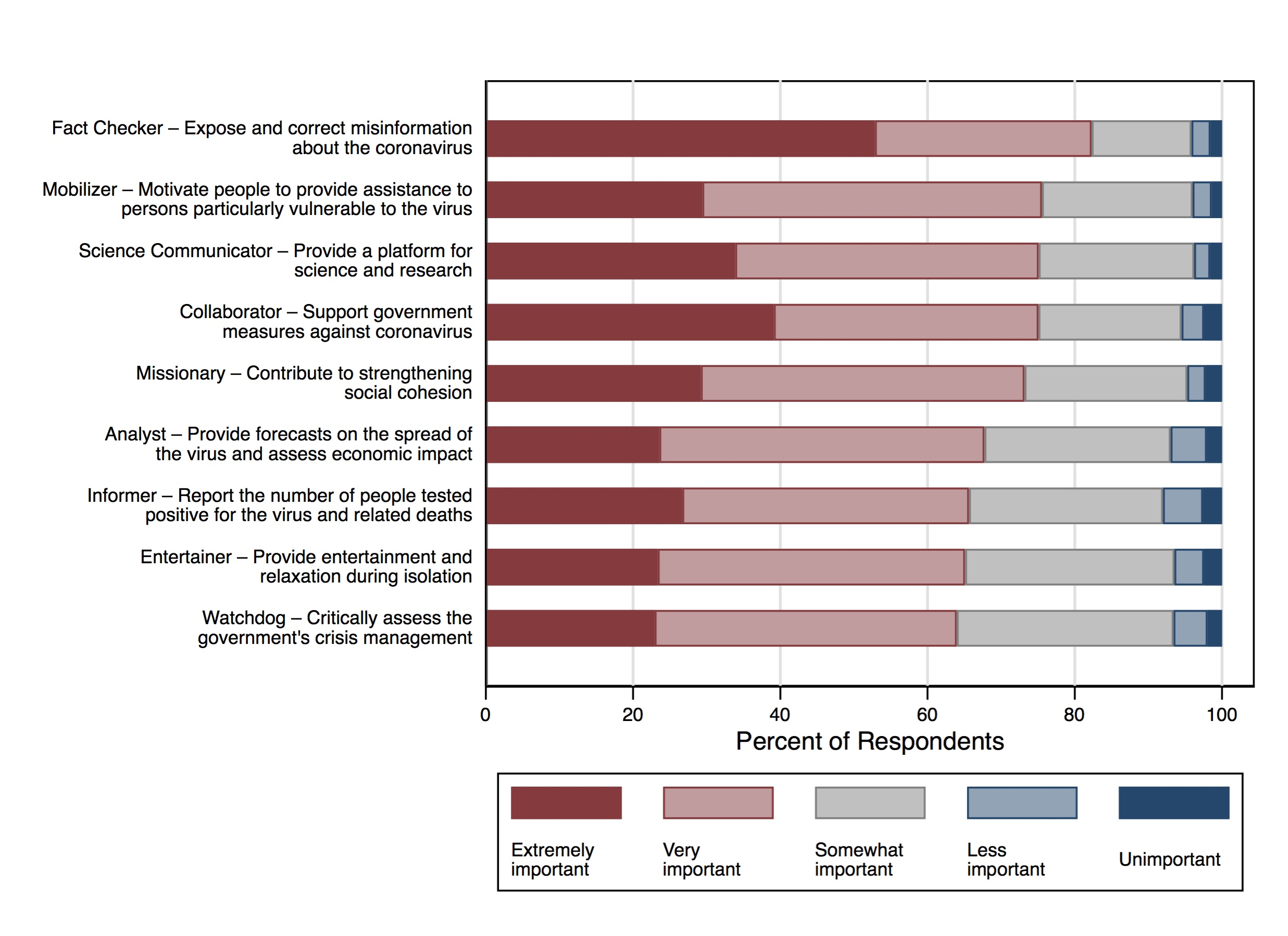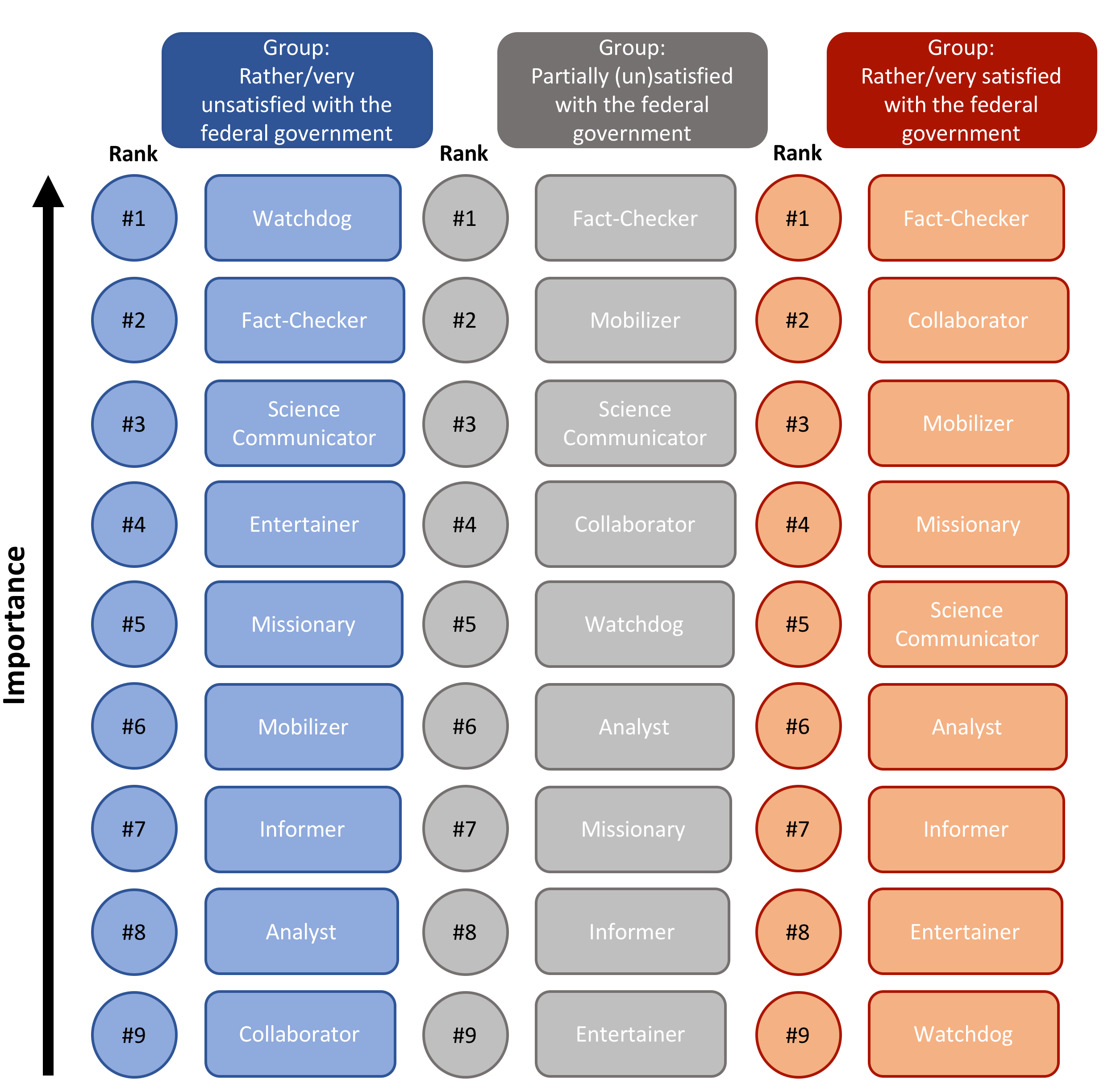18.05.2020
Audience Expectations of Coronavirus Reporting: From Watchdog to Lapdog?
- Audience expectations of coronavirus reporting are high. All nine journalistic roles surveyed are considered "very" or "extremely important" by more than 60% of the respondents.
- The fact-checker, i.e., journalism that seeks to expose and correct disinformation, is valued as the most important role (82% of respondents).
- Of all journalistic roles, the critique and control function of journalism is considered the least important.
- Ultimately, the understanding of journalism as the fourth estate is strongly dependent on satisfaction with the federal government. While the critical watchdog is the top priority for respondents who are dissatisfied with the government, the collaborator, i.e., journalism committed to supporting government measures, is considered as one of the most important for those satisfied with the government.
By Jakob-Moritz Eberl, Andreas Riedl and Noelle S. Lebernegg
Especially in times of crisis, the public is highly dependent on journalistic reporting. It is also the central source of relevant information on the coronavirus in the current crisis. However, in a democracy, mass media fulfill a variety of functions that go beyond their role as mere disseminators of information, even if they are not always fulfilled to the same extent by all media. Among other aspects, journalism in a democracy is assigned the role of a so-called watchdog – the Fourth Estate, referring to a government’s separation of power into executive, legislative and judicial branches – which is supposed to keep an eye on the powerful in society. However, not everyone in Austrian politics is in favour of a press that is critical of the government.
But what do audiences expect from coronavirus reporting? Which roles of journalism do they currently consider essential? In the following article, we will explore these questions. Additionally, with particular attention to the critique and control function of journalism, we examine how these expectations of coronavirus reporting are related to citizens’ government satisfaction. For this purpose, we use the data from the third wave of our panel survey.
High Expectations of Journalism
To get to the bottom of audience expectations of coronavirus reporting, we asked our respondents to rate nine journalistic roles in their importance. A description of each role expectation is shown in Figure 1.

Figure 1: Audience expectations of coronavirus reporting (Notes: Field time: April 10-16, 2020, N=1,500 persons interviewed (14 years and older), data is weighted and representative for the Austrian resident population. Roles ranked according to the proportion of respondents who answered "very important" or "extremely important").
Our results show that audience expectations of coronavirus reporting are generally high. Each of the nine roles was rated as a "very" or "extremely important" function of journalistic news media during the corona crisis by more than 60% of the respondents. Nevertheless, some roles are considered more important than others.
The WHO recently lamented an "infodemic" associated with the coronavirus pandemic, that is, the uncontrolled spread of disinformation about the virus. Citizens are obviously aware of this threat as well since the fact-checker – who is supposed to expose and correct disinformation about the coronavirus – is perceived as most relevant. 82% of the respondents consider this role as "very" or "extremely important".
In addition to providing correct information, many also expect entertainment and relaxation from journalism. 65% of the respondents perceive the entertainer as "very" or "extremely important". This raises the question of whether journalism should pay more attention to topics other than the omnipresent coronavirus. Ultimately, journalism also bears an emotional responsibility, as it is not only necessary to keep citizens informed, but also to keep an eye on their social well-being.
Our results also demonstrate a clear tension between watchdog and collaborator. The watchdog, concerned with criticizing those in power and uncovering hidden grievances, ranks at the very bottom of expectations. This pattern can also be seen in another section of the survey, where 40% agree with the statement that the media should be cautious in their criticism of the federal government regarding the corona crisis. In contrast, audiences expect a collaborator whose main task is to support the government’s coronavirus measures. Here we can see what is also described as ethics of responsibility: Although the role of a collaborator may violate the principle of independence of many, journalists are responsible for the consequences of their actions (e.g., the acceptance of protective measures). However, in the end, there is also the danger of establishing a state of obsequious journalism. Regardless of this risk, the public seems to have a pretty clear opinion: The collaborator is currently more important for citizens than the watchdog.
A Watchdog that Polarizes
In particular, due to the tension between the last two roles, the (potentially) government-critical watchdog and the benevolent collaborator, the question arises how universal this setting of priorities by the public is. In other words, whether the importance of different roles differs between specific subgroups. For this reason, we divided respondents into three groups based on their satisfaction with the federal government: First, those who are "rather" or "very dissatisfied" with the federal government (11%); second, those who are "partially satisfied" (24%); and third, those who are "rather" or "very satisfied" (65%). We then compared the expectations between the three groups based on the percentage of respondents who rated the respective journalistic roles as "very" or "extremely" important (see Figure 2).

Figure 2: Ranking of expectations of corona reporting according to satisfaction with the federal government (Notes: Field time: April 10-16, 2020, N=1,500 persons interviewed (14 years and older), data is weighted and representative for the Austrian resident population. Rank #1 = Highest importance; Rank #9 = Lowest importance).
Among those dissatisfied, the watchdog is perceived as the most crucial journalistic role, while the collaborator has the lowest priority. Among those respondents who are neither fully satisfied nor dissatisfied with the work of the federal government to date, both roles are in the middle range. Among those who are satisfied, the collaborator is in second place while the watchdog has the lowest priority.
A Plea for the Fourth Estate
Overall, the very high expectations of the many different aspects of journalistic reporting underline the crucial role of journalism (especially) in times of crisis. Journalism is and remains indispensable – also in the perception of the public. This should not be left behind in the months and years to come when its economic foundation might get even more precarious than it already is.
In light of this analysis, this plea applies especially to the role of the watchdog, as it is the basis for critical and investigative journalism. When the current crisis is over and/or satisfaction with the federal government declines, citizen expectations of critical journalism will probably increase. However, as a society, even in times of high government satisfaction, we are well-advised to ensure that the watchdog does not turn into a lapdog.
Jakob-Moritz Eberl has been a post-doc at the Department of Communication at the University of Vienna since April 2017 and a member of the Austrian National Election Study (AUTNES, Media Side) since 2013. He is also an associate researcher at the Vienna Center for Electoral Research (VieCER) and deals with questions on media effects, media trust, and voting behaviour.
Andreas Riedl is Junior Scientist at the Institute for Comparative Media and Communication Studies (CMC) of the Austrian Academy of Sciences in Vienna and the University of Klagenfurt, where he is part of the working group "Media, Politics & Democracy". His research focuses on media quality, journalistic roles, and the mediatization of politics.
Noelle Lebernegg is a University Assistant (Prae-Doc) at the Department of Communication at the University of Vienna and an associate researcher at the Vienna Center For Electoral Research (VieCER). She focuses on the impact of political communication and media on public opinion and voting behaviour.
Related Blog Posts
- Blog 4 (EN) - Old and New Media: Media Use in Times of the Corona Crisis
- Blog 12 (EN) - Most people take the situation seriously. But who are the Coronavirus skeptics?
- Blog 15 (EN) - Of Misunderstood Snoopers and Other Anti-Coronavirus-Activists
- Blog 21 (EN) – Old And New Media: Disinformation in Times of the Corona Crisis
